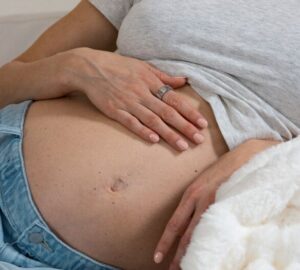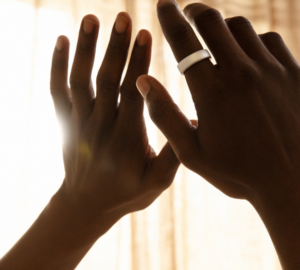Ever wondered how your sex life impacts your sleep? Whether it helps you drift off faster or leaves you tossing and turning, sex and sleep are deeply connected—not just because they often happen in the same place! Many of the same physiological processes involved in intimacy also play a role in promoting restful sleep.
We’ll explore the connection between the two and how improving one can benefit the other, along with insights from de-identified, aggregated data from Oura members.
Does Sex Make You Sleepy?
For many, sex acts as a natural sleep aid. This aligns with scientific findings: the physical and emotional intimacy of sex triggers a release of key neurotransmitters—oxytocin, serotonin, and endorphins—that promote relaxation and reduce stress.
However, others may find that getting busy before bed keeps them awake. Why the difference? It boils down to your body’s physiological response, your emotional state, and even the timing of the activity.
Member Data: On days that Oura members tagged “Sex,” de-identified and aggregate data showed that members experienced the following improvements, compared to the previous day:
|
What’s at Play?
The Calming “Love” Chemicals
- Oxytocin, often called the “love hormone,” fosters feelings of closeness and calm, which help lower stress and anxiety.
- Serotonin, a neurotransmitter linked to mood regulation, enhances feelings of well-being and relaxation, making it easier to unwind.
- Endorphins can reduce pain and increase happiness, contributing to a sense of contentment and tranquility.
Together, these calming chemicals have sedative effects, slowing your heart rate and lowering blood pressure, which creates the perfect environment for quality sleep.
A Light Workout
Sex can be a form of moderate-intensity exercise. A study found that, on average, men burn about 101 calories (4.2 calories per minute), while women burn around 69 calories (3.1 calories per minute) during sex. This light physical activity can leave you feeling pleasantly fatigued and ready for rest.
Stress Relief
Sex can additionally lower cortisol, your body’s primary stress hormone. The combination of stress relief, emotional connection, and physical exertion activates the parasympathetic (rest-and-digest) system, preparing your body for rest.
On the Other Hand…
Not everyone can drift off to sleep after a physical connection.
For some, the heightened physical activity or increased body temperature can be stimulating, delaying the body’s natural cooling process essential for sleep onset. Additionally, emotional factors such as stress or negative feelings around intimacy can lead to rumination, making it difficult to relax.
READ MORE: Male and Female Sleep Patterns: How Do They Differ, and Why?
How Sleep Impacts Sex
Sex and sleep are innate biological drives that affect your physical, emotional, and cognitive well-being—and each one affects the other.
If you’re not sleeping well, it can have a significant impact on your sex life. Sleep deprivation, in particular, can lower sexual desire and impair sexual function and satisfaction. “No aspect of our biology is left unscathed by sleep deprivation,” notes sleep scientist Matthew Walker, PhD. “Sleep is like the body’s orchestra conductor, ensuring our hormones, neurotransmitters, and all major organ systems work together in harmony, keeping your brain and body running smoothly.”
1. Hormonal Changes
“Reproductive hormones like estrogen and testosterone are critical for a healthy sexual relationship,” says Walker. “We see in research that otherwise healthy young men who sleep five hours a night for one week will have a testosterone level of someone 10 years their senior. That is, a lack of sleep can age someone by a decade in terms of this critical hormone of vitality and virility.”
Similar findings have been discovered among women: One study shows that just an hour of extra sleep is associated with a 14% increased likelihood of women wanting to be physically intimate with their partner.
2. Sexual Function
Hormonal imbalances caused by sleep deprivation can lead to sexual dysfunction, including erectile dysfunction in men and reduced pleasure and orgasm in women.
Erectile dysfunction affects an estimated 30 million men in the United States. This common condition is believed to be partly caused by hormone imbalances in thyroid hormones, testosterone, and cortisol. In fact, several studies have indicated that insufficient sleep is a leading cause of this condition.
Among women, poor sleep is linked to vaginal dryness, reduced sexual pleasure, and trouble with orgasm.
3. Mood Changes and Increased Fatigue
Sleep deprivation can lead to tiredness, anxiety, and mood swings, all of which can reduce your desire for intimacy. A study found that one in every four married or cohabiting couples don’t have sex because they’re too tired. Tiredness also impacts your mood and mental well-being, with studies showing that not getting enough sleep increases anxiety.
Conversely, high-quality sleep is associated with emotional regulation, mental clarity, enhanced energy, and, you guessed it, a higher libido.
READ MORE: How Dreams Help Regulate Your Emotions and Reduce Stress
4. Emotional Conflict
“When couples aren’t getting enough sleep, they are more likely to have conflicts the next day, which may not get resolved effectively because they’re tired,” says Walker. “This is partly because of a loss of empathy caused by fatigue, and because sleep-deprived individuals generate fewer and less accurate solutions to problems. In other words, sleepless nights lead to worse fights.”
Plus, difficulties in emotional regulation are related to sexual difficulties and sexual dissatisfaction.
5. Increased Risk of Sleep Disorders
“Sleep disorders reduce your overall health and vitality, so it should come as no surprise that they also impact your sex life,” Walker explains. Chronic sleep issues such as insomnia, sleep apnea, and restless leg syndrome have been linked to reduced sexual satisfaction and activity.
6. Fertility
Research suggests that inadequate sleep can disrupt reproductive hormones and fertility, potentially straining a couple’s emotional and physical connection, Walker notes. In fact, the National Sleep Foundation has found that women who get less than seven hours of sleep are 15% less likely to get pregnant than those who get an adequate amount, while men who sleep less than six hours have impaired sperm health.
RELATED: Sleep & Fertility: What’s the Link?
| Member Tip: Learn more about your menstrual cycle and fertile days with Oura’s Fertile Window feature. |
Better Sleep, Better Sex
If your sleep or sex life needs a little boost, try these strategies.
- Time it right. If sex disrupts your sleep, schedule it earlier in the day. If it helps you sleep, use it as a natural wind-down tool at night.
- Embrace all types of connection. Studies show that sex isn’t the only way to induce sleep. Cuddling or physical touch without sex can also reduce stress and improve sleep quality.
- Check your hormones. Seek professional help if you suspect hormone imbalances or are experiencing low libido or sexual dysfunction.
- Consider a “sleep divorce.” Though it is poorly named, it’s not as scary as it may sound, Walker noted. A sleep divorce is when a couple makes a conscious decision to sleep in separate spaces to get better sleep. Walker states that having a sleep divorce doesn’t necessarily reduce intimacy—and well-rested individuals are more likely to have a higher libido.
- Sleep regularity is key. Go to bed at the same time and wake up at consistent times, Walker advises, and make sure you’re getting at least seven hours of total sleep.
- Improve sleep hygiene. Sleep in a dark, cool bedroom; avoid food and drinks an hour before bed; remove distractions like phones; and spend time before bed winding down your body and mind.
By improving your sleep habits and understanding the connection between sex and sleep, you can enjoy the best of both worlds—restful nights and fulfilling intimacy.
| Member Tip: Follow the Bedtime Guidance feature on Oura to keep you on track to maintain consistent bedtime. |










